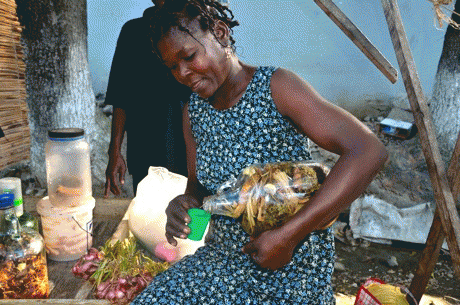With invaluable assistance in translation, cultural matters, and investigations from Andre Paultre--a Haitian man who deeply loves his country
On February 5 we spent a day traveling to the mountains of Haiti's Arcahaie region in the Quest Department to investigate mysterious deaths among villagers.
Internet chatter began in earnest on January 26 when foreign medical interests in Haiti reported sudden onsets of blindness, breathing difficulties, paralysis and death in the remote Haitian village of Fond Baptiste. Men, women, and babies were falling ill with no apparent epidemiologic reason. It was not cholera and it was not polio, as some initially suspected. As the mystery unfolded the common consensus was that villagers had fallen prey to murderous merchants in the local markets who were selling methyl alcohol, an industrial solvent, disguised as the popular local drink called "Clairin." But in some cases NGOs were blaming the victims and accusing the villagers of making their own "moonshine" because they were depressed. "Villagers drink to drown depression," became one theory.
Clairin is sold as a cheap alternative to rum. Dispensed by the shot or by the gallon in local markets, Clairin is distilled from molasses or sugar cane. Depending on how many times it is distilled, its potency can reach 190 proof. Villagers will use it to warm babies who don't have enough shelter in the mountains, and Clairin is also used to put infants to sleep. The use of Clairin is deeply ingrained in the culture and it is what the poor, the "peasants", use for celebration, mourning, or mixed with herbs as a medicinal drink. There is nothing unusual or sinister about the use of Clairin, although one could argue against its use for purely medical reasons. But, then we would be arguing from a position of white privilege and forcing behavior upon a culture that finds comfort in its traditional values.
We met a "medsin fey" (leaf doctor) in La Pointe who used generations of knowledge to mix certain herbs in gallon jugs of Clairin. Depending upon what ails you, she would recommend certain combinations of plants. This wise medicine woman and her mother wanted me to try a taste, and I was tempted, but I was also certain the alcoholic content was too much to handle, so I begged off. They found my reluctance quite humorous. My point in telling the anecdote is that Clairin is not anything more than a very strong alcoholic drink and sometimes holds traditional medicinal values.
Methanol, on the other hand, is highly toxic wood alcohol. You can find it in automotive windshield washer fluid, copy machine fluids and paint strippers.
Whoever sold methanol disguised as Clairin to unsuspecting villagers knew exactly what they were doing, and the problem has not ended with the first fifteen cases reported at the end of January. These merchants of death are doing it solely for profit.
Yesterday, Le Nouvelliste reported that a 54-year-old man died at Lafito, near the Cabaret area on the night of Febraury 16. Cabaret is one of the area authorties investigated when the poisonings began. The man was reported to be the seventh of the newest victims--victims who unknowingly purchased their own "la mort serait dans la bouteille" (deaths in a bottle) for "a handful of gourds."
When we visited Fond Baptiste and other villages on February 6, there was concern that the deaths were not over, that the merchants had hidden the methanol disguised as Clairin, and that once the heat was off, sales of the poison would begin anew. Villagers were fearful and in some cases, angry. They felt that the Haitian government was not conducting a rigorous investigation. They may be right.
It a country the size of Maryland, it seemed odd that officials and the combined efforts of all of the medical NGOs in the area had not been able to track the source of the methanol sales. So, we set out to find out the where and whys of this story, while hoping that with some luck we would find the "who."
It is not easy to get to Fond Baptiste. We took the main Highway 1 north along the coast from Port-au-Prince to Saint-Medard, where we turned towards the mountains on a narrow, boulder-strewn road. Even in a four-wheel drive, there were times when it seemed we might not be able to navigate roads that barely had room for burros and donkeys.
We passed many villages along the way and stopped to talk to people as we asked directions. Chalk-like paths forked from "the main road," and it was difficult to tell a donkey trail from the road in many areas. People were aware of what had happened in Fond Baptiste, but the deaths were limited to that village.
People were also eager to talk. Many were hoping we had come to bring them water. They were out of Aquatabs, the trade name for water purification tablets used to prevent cholera contamination of their drinking and cooking water. We received many requests for the tablets.
Next Page 1 | 2 | 3 | 4 | 5 | 6 | 7
(Note: You can view every article as one long page if you sign up as an Advocate Member, or higher).






